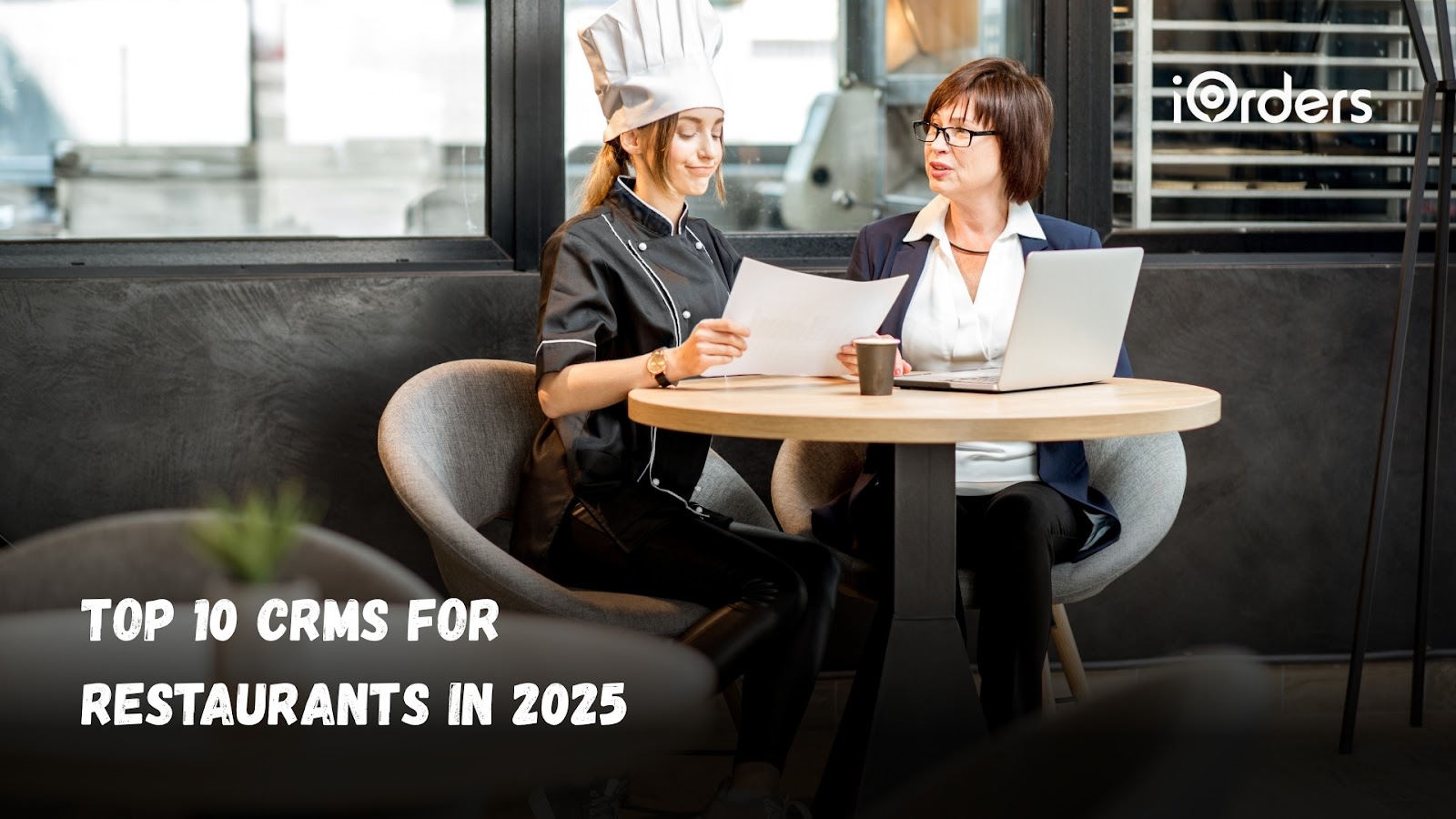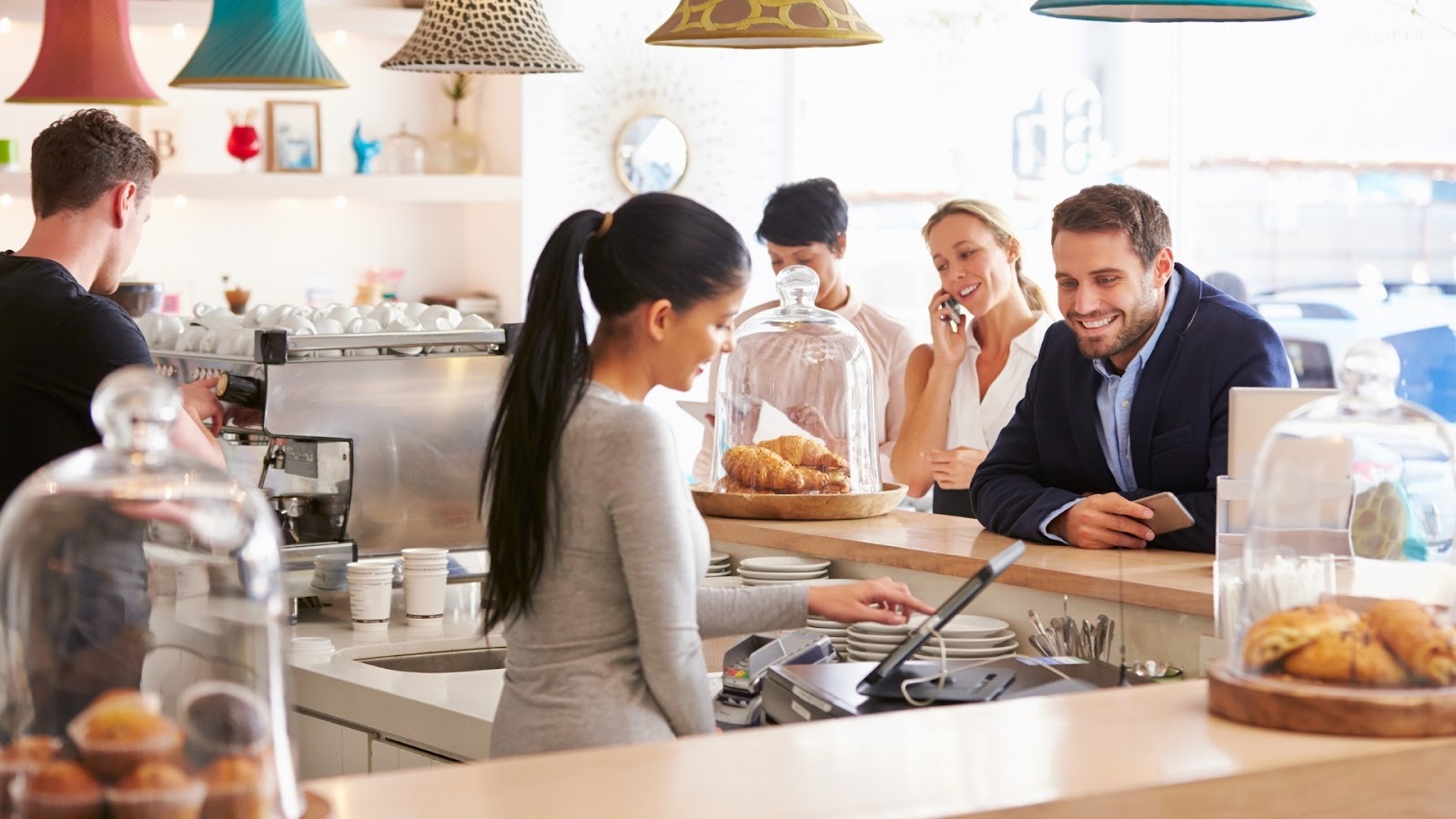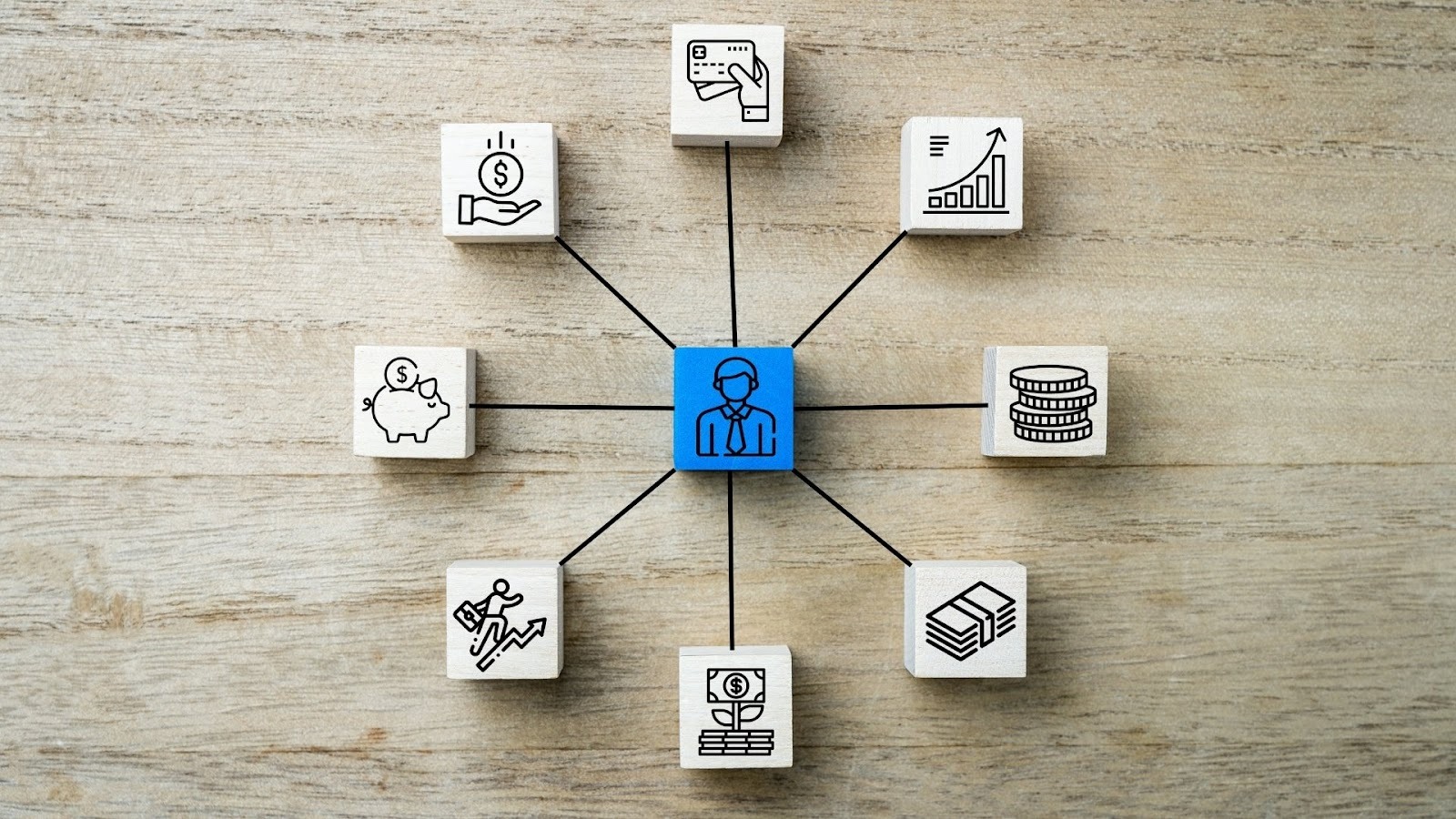October 22, 2025

Running a restaurant isn’t just about great food. It’s also about creating seamless experiences for your customers, keeping your team organized, and making smart business decisions.
That’s where a CRM for restaurants comes in. From managing reservations and tracking guest preferences to running loyalty programs and marketing campaigns, the right CRM can turn scattered operations into a smooth, profitable system.
This blog explores the top 10 CRMs for restaurants in 2025, showing how each can help your restaurant enhance its workflow.
At a Glance:
Running a successful restaurant today goes beyond serving great food. It’s about truly understanding your guests, anticipating their needs, and creating experiences that keep them coming back.

Alt text:Why Are CRMs Important for Restaurants in 2025?
At the same time, you need to manage operations efficiently, minimize errors, and make data-driven decisions that impact your bottom line. A restaurant CRM acts as a central hub for all your customer data, consolidating information from reservations, POS systems, loyalty programs, and online orders.
Here’s why CRMs have become essential for restaurants in 2025:
A CRM that combines automation, analytics, and personalization is more than just software. It strengthens customer relationships, increases operational efficiency, and ultimately drives higher revenue.
Also Read: Best Restaurant Reservation Apps and Systems for 2025
Guests today expect a personalized experience, from the way they’re greeted to the offers they receive after dining. That’s where CRM software for restaurants comes in. These platforms give you the tools to truly know your customers, streamline your operations, and keep people coming back for more.

Alt text:10 Best CRM Software for Restaurants in 2025
Restaurant CRMs have evolved far beyond just storing customer contact details. They now integrate with point-of-sale systems, manage reservations, track loyalty rewards, power smart marketing campaigns, and even use AI to deliver insights that can shape your menu and promotions. Whether you run a cozy café or a multi-location chain, the right CRM can help you connect with diners on a deeper level and make smarter business decisions.
Here are the top 10 CRM tools that are trending for restaurants:
While iOrders isn’t a traditional CRM platform, it offers a powerful suite of tools that address many of the same goals. This includes building stronger guest relationships, boosting loyalty, and streamlining operations.
iOrders positions itself as an all-in-one solution for restaurants that want simplicity and results, focusing on commission-free online ordering, integrated marketing, and customer engagement.
Key Features and Their Relevance for Restaurants:
For restaurants that want a CRM-like solution without the complexity of traditional platforms, iOrders provides a practical and results-driven alternative. By combining online ordering, loyalty management, marketing automation, and guest engagement in one platform, it helps restaurants strengthen customer relationships, cut costs, and scale with confidence.
OpenTable is one of the most recognized names in the restaurant tech space, and for good reason. While it’s often associated with online reservations, it also functions as a powerful CRM by helping restaurants capture guest data, understand dining habits, and personalize experiences.
For restaurants that thrive on repeat business and want to strengthen relationships with their guests, OpenTable offers an all-in-one solution.
Key Features:
Differentiator: What sets OpenTable apart is its ability to blend guest relationship management with an industry-leading reservation system. Unlike many CRMs that require multiple integrations, OpenTable centralizes guest data and booking activity in one place, giving restaurants a 360° view of customer interactions.
This makes it especially valuable for restaurants that prioritize high-touch service and want to nurture long-term guest loyalty.
While not built exclusively for restaurants, HubSpot is one of the most versatile CRM platforms available, and its robust marketing and automation features make it a strong choice for restaurant owners who want to elevate customer engagement.
From capturing diner information to running targeted campaigns, HubSpot helps restaurants turn one-time visitors into loyal, returning guests.
Key Features:
Differentiator: Unlike restaurant-specific CRMs, HubSpot brings the depth of an enterprise-grade marketing platform into the hospitality space. Its strength lies in helping restaurants build scalable marketing strategies that go beyond reservations and loyalty programs.
For growing brands that want to stand out in competitive markets, HubSpot provides the tools to nurture relationships at scale while still keeping the personal touch.
Toast is best known as a modern, restaurant-focused point-of-sale (POS) system, but it also doubles as a powerful CRM tool. By connecting directly with your ordering and payment workflows, Toast automatically gathers customer data and turns it into insights that help restaurants deliver more personalized service and targeted marketing campaigns.
For operators who want their CRM tightly integrated with day-to-day operations, Toast is a standout option.
Key Features:
Differentiator: What sets Toast apart is its deep integration between POS and CRM functions. Unlike standalone CRMs that rely heavily on integrations, Toast captures data at the transaction level and puts it directly to work.
This makes it ideal for restaurants that want a frictionless system where customer relationship management is baked into the same platform that runs their operations.
SevenRooms is a hospitality-focused platform that goes beyond reservations to deliver a full guest experience management system. Designed specifically for restaurants, bars, and hotels, it captures valuable guest data at every touchpoint.
This includes reservations, online orders, events, and even in-service interactions. With its powerful CRM capabilities, SevenRooms helps restaurants personalize service, drive repeat visits, and maximize guest lifetime value.
Key Features:
Differentiator: What sets SevenRooms apart is its 360° view of the guest journey, before, during, and after their visit. Unlike basic reservation tools, it combines marketing, guest data, and service personalization into one seamless ecosystem.
This makes it especially valuable for restaurants that want to strengthen long-term customer loyalty and provide high-touch, memorable dining experiences.
BigContacts CRM is a straightforward, easy-to-use platform designed for small and medium-sized businesses, including restaurants that want a no-fuss way to manage guest relationships.
It focuses on consolidating customer information, simplifying communication, and automating follow-ups, making it a practical choice for operators who don’t need overly complex systems but still want powerful CRM functionality.
Key Features:
Differentiator: BigContacts stands out for its simplicity and accessibility. Unlike larger, enterprise-grade CRMs, it offers an intuitive interface with features that are easy to adopt, even for smaller teams without dedicated IT resources.
For restaurants seeking a balance of functionality and ease of use, BigContacts delivers an affordable, all-in-one CRM solution that doesn’t overwhelm.
Restaurant365 is a full-scale restaurant management platform that integrates accounting, payroll, inventory, and CRM capabilities into one system. Designed specifically for the food service industry, it helps operators connect customer relationship management with back-office operations. It gives you a complete view of both guest experiences and business performance.
Key Features:
Differentiator: What sets Restaurant365 apart is its seamless integration of CRM with core restaurant operations. Unlike standalone CRMs, it connects customer engagement directly with financial, staffing, and inventory data, allowing restaurants to see the full picture of how guest relationships impact business performance.
For multi-location operators or restaurants that want an all-in-one solution, Restaurant365 is a powerful choice.
Salesforce is a global leader in CRM, and while it isn’t restaurant-specific, its flexibility and advanced features make it a strong choice for larger or multi-location restaurant groups.
With its powerful integrations, automation, and customer data tools, Salesforce helps restaurants deliver highly personalized experiences and manage customer relationships at scale.
Key Features:
Differentiator: What makes Salesforce stand out is its scalability and customization. It’s ideal for enterprise-level restaurants or groups that need complex workflows, integrations with POS and loyalty platforms, and multi-location visibility.
Smaller independent restaurants may find it overwhelming, but for businesses aiming to operate with data precision and enterprise-grade efficiency, Salesforce provides unmatched depth.
EatApp is a restaurant-focused CRM and reservation management system that helps operators streamline guest bookings, reduce no-shows, and build stronger guest relationships.
By combining reservations, waitlists, and customer data into one platform, it ensures restaurants can deliver smooth service and personalized experiences.
Key Features:
Differentiator: EatApp stands out for its specialization in reservations and guest experiences. Unlike broader CRMs, it’s purpose-built for restaurants to maximize table efficiency while enhancing hospitality.
For restaurants where managing bookings and personalized guest service is a top priority, EatApp offers a focused and effective solution.
Zoho CRM is a versatile, cost-effective solution that suits restaurants looking to manage customer relationships without overspending. While it isn’t designed exclusively for the food service industry, its customizable tools make it easy for restaurants to track guest interactions, automate communications, and improve loyalty programs.
Key Features:
Differentiator: Zoho CRM shines with its affordability and flexibility. It’s one of the most budget-friendly CRMs on the market, offering restaurants powerful tools at a fraction of the cost of enterprise solutions.
For independent restaurants, quick-service operators, or small groups looking for value without compromising on features, Zoho is an excellent choice.
Also Read: Types of POS Systems: Choosing the Right Fit for Your Restaurant
With so many CRM platforms available, choosing the right one for your restaurant can feel overwhelming. The truth is, the best CRM isn’t just the one with the most features, it’s the one that matches your restaurant’s size, budget, and goals.

Alt text:How to Choose the Right CRM for Your Restaurant Requirements?
Whether you run a cozy café, a busy quick-service spot, or a multi-location restaurant, the right system should simplify operations and help you connect meaningfully with your guests.
Here are a few key factors to consider before making your decision:
1. Ease of Use: A CRM should fit naturally into your daily operations. If the software requires endless training or adds layers of complexity, your team won’t use it consistently. Look for a solution with an intuitive interface that staff can pick up quickly, even during the busiest lunch rush.
Seamless integration with your POS, reservation systems, and payment gateways is key, otherwise, you’ll end up duplicating work or switching between multiple screens. A system like this should feel less like “new tech” and more like a helpful extension of your existing workflow.
2. Guest Data & Personalization: Data is the new currency in hospitality. The right CRM should centralize everything you know about your guests, like contact details, order history, allergies, dietary preferences, and even how often they visit. When used well, this data allows you to:
Personalization isn’t just nice to have anymore. It’s what makes a customer choose you over a competitor. A strong CRM helps you transform raw guest data into genuine experiences that build lasting loyalty.
3. Marketing Capabilities: Marketing is often the difference between an occasional guest and a repeat customer. A powerful CRM should automate this process so your team doesn’t need to send every email or SMS manually. Instead, you can set up automated campaigns triggered by events like birthdays, holidays, or even a guest not visiting for a few weeks.
The ability to segment your customer base, like families, students, frequent diners, means your marketing feels less generic and more like a direct conversation with your community.
4. Scalability: Your restaurant today may be small, but what about in two years? A good CRM should support you whether you’re running one location or ten. Scalability isn’t only about handling more orders; it’s also about managing multi-location operations, growing loyalty programs, and expanding marketing campaigns without extra headaches.
Think of your CRM as an investment; choosing the right one means you won’t outgrow it when your restaurant succeeds.
5. Delivery & Order Management: Many restaurant CRMs stop at customer data, but in today’s world, delivery and online orders are core to the guest experience. A CRM that also supports commission-free online ordering, integrates with delivery partners, or offers white-labeled solutions ensures your customers interact only with your brand, not third-party apps.
When choosing a CRM, think beyond customer data; it’s about building lasting relationships, running efficient operations, and protecting your margins. If you want a solution that goes beyond traditional CRMs and truly caters to restaurant realities, platforms like iOrders stand out.
It combines commission-free ordering, loyalty programs, smart campaigns, and delivery-as-a-service in one system. Instead of juggling separate tools, restaurants get everything under one roof.
Managing a restaurant today comes with a lot of challenges. Juggling reservations, online orders, customer preferences, marketing campaigns, and delivery logistics can easily overwhelm even the most experienced teams. Without the right system, important guest data gets lost, orders slip through the cracks, and opportunities to build loyalty are missed.
This is where platforms like iOrders shine, helping restaurants streamline operations while keeping every customer interaction personal and meaningful. For iOrders, it’s not just about technology; it’s about making day-to-day restaurant management simpler, more profitable, and more guest-focused.
For restaurants looking to turn operational chaos into a smooth, customer-first experience, iOrders provides the tools to do it all in one place.
Book a free demo with iOrders to see how it can transform your restaurant today.
1. How do restaurant CRMs support allergy and dietary preference tracking?
Restaurant CRMs can record and highlight customer-specific allergies or dietary requirements in guest profiles. This information enables staff to make safe, personalized menu recommendations, automate allergy alerts for kitchen teams, and ensure exceptional, safe service for repeat diners, improving customer trust and reducing risk.
2. Can a restaurant CRM automate guest feedback collection and analysis?
Modern CRMs routinely send automated post-visit surveys via text or email, capturing guest feedback for management review. They can analyze ratings and comments at scale, surfacing trends and actionable insights, helping managers quickly address issues, refine service standards, and boost overall guest satisfaction with data-backed improvements.
3. How do CRMs help restaurants improve upselling and cross-selling rates?
CRMs analyze each customer’s preferences and spending habits, then prompt staff to suggest tailored add-ons or pairing options, such as appetizers or specialty drinks. This data-driven approach not only personalizes guest experiences but also increases check sizes and drives greater revenue with every visit.
4. Are restaurant CRMs capable of handling group reservations and event planning?
Advanced CRMs offer solutions for organizing group reservations, private dining, or events, storing guest notes, preferences, and logistical details. They streamline coordination and communications, ensuring custom experiences for larger parties. This enhances event planning efficiency and helps restaurants maximize special occasion revenue.
5. Which integrations make restaurant CRMs more powerful for marketing automation?
Top CRMs offer integration with marketing tools such as email, SMS, social, and third-party loyalty programs. This allows restaurants to create highly personalized, automated campaigns based on guest data and visit behavior, maximizing reach, retention, and conversion without additional manual effort.
6. What data security features should restaurants look for in CRM software?
Effective restaurant CRMs employ data encryption, two-factor authentication, GDPR and PCI-DSS compliance, and frequent security updates. These safeguards protect sensitive customer details and transaction histories, and prevent data breaches, ensuring both legal compliance and guest trust in digital dining experiences.
7. Can restaurant CRMs track and reward referrals or advocacy programs?
Yes, some CRMs include modules for tracking customer referrals and rewarding advocates via points, discounts, or exclusive perks. By monitoring sharing activity and incentivizing word-of-mouth, restaurants can organically expand their customer base, foster loyalty, and strengthen community buzz at minimal marketing cost.